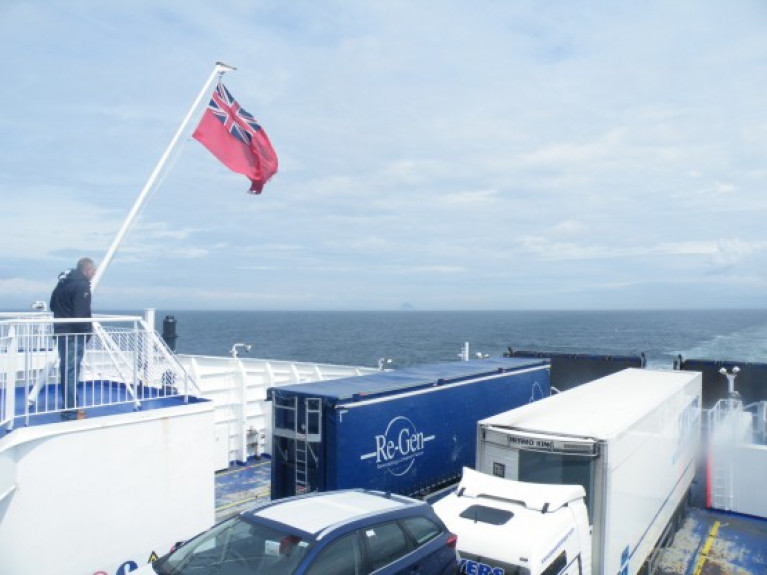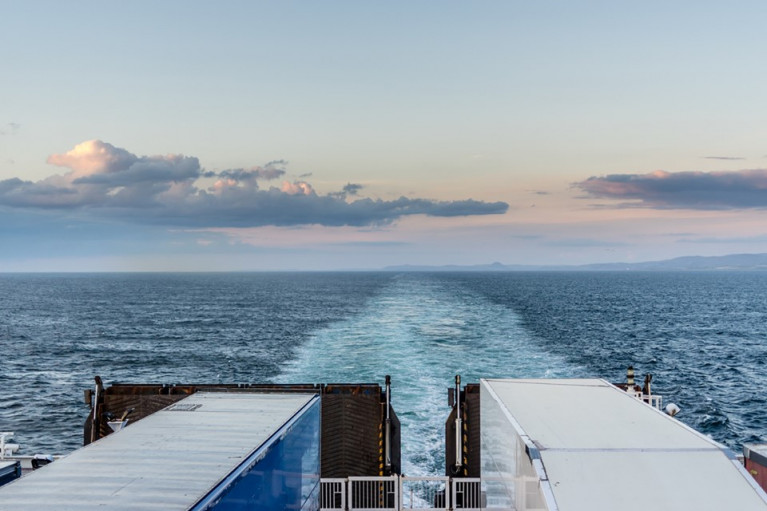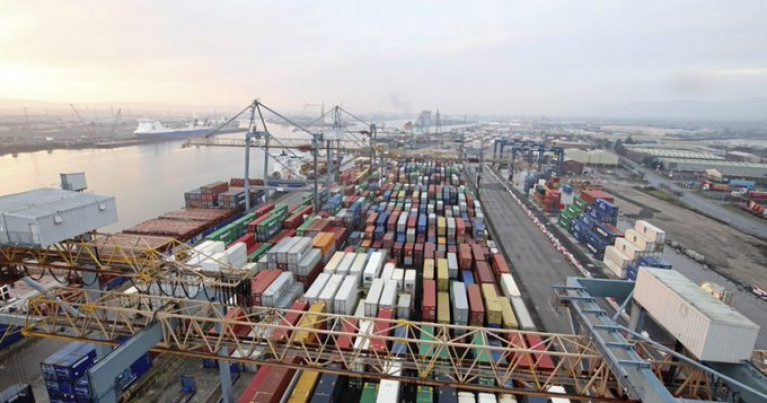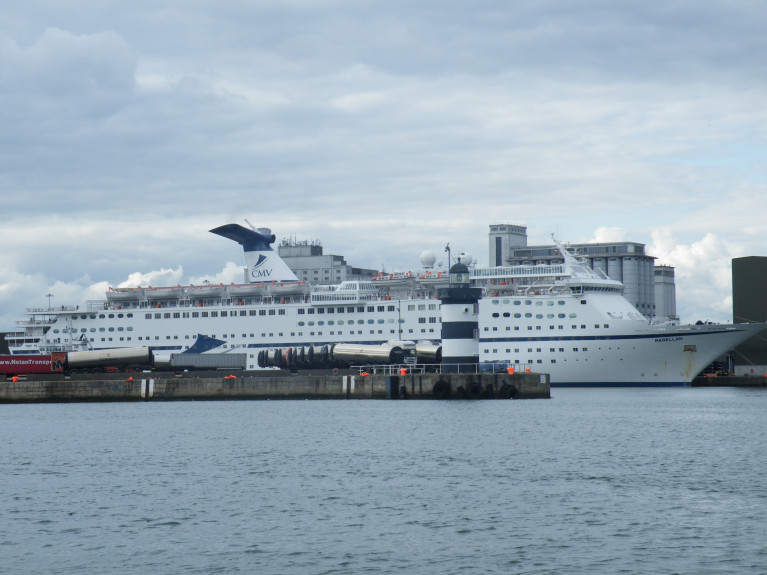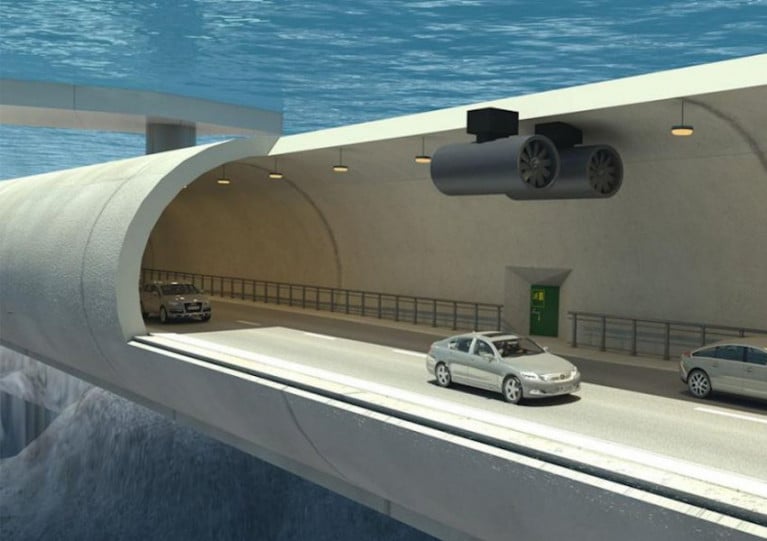Displaying items by tag: Brexit
What Northern Ireland Boaters Need to Know About Red Diesel Ban
As reported earlier this year on Afloat.ie, the ban on the use of red diesel to propel private pleasure craft in Northern Ireland has come into effect.
As of 1 October 2021, following an extension from this past summer, private pleasure craft in Northern Ireland must use diesel, biodiesel or bioblend on which duty has been paid at the full (unrebated) rate in the motor used for propulsion.
Vessels with one fuel tank (for both propulsion and non-propulsion) cannot use red diesel unless it was put into the fuel tank either in:
- Northern Ireland before 1 October 2021; or
- a jurisdiction where using red diesel for propulsion of private pleasure craft is legal post-Brexit, such as Great Britain, the Channel Islands and the Isle of Man.
Boaters who travel to Northern Ireland having refuelled with red diesel elsewhere are advised to keep documents (such as receipts, logbooks and declarations) to show HMRC where and when the vessel was refuelled.
Private pleasure craft in Northern Ireland (including houseboats) with separate tanks for propulsion and non-propulsion uses may continue to use red diesel in the non-propulsion fuel tank — but the supplier cannot allow any discount on the ‘white’ diesel because it is all being used for propulsion.
In addition, any residential craft with a single tank supplying an engine which does not propel the vessel may continue to use rebated (red) diesel.
Fuel suppliers in Northern Ireland who sell white diesel for private pleasure craft with a single fuel tank can register for a new HMRC relief which allows to deduct at point of sale an amount equal to the duty rebate on 40% of the total volume of white diesel supplied.
More can be found in Excise Notice 554 (Fuel used in private pleasure craft and for private pleasure flying) on the Gov.uk website HERE.
According to BBC News, the EU is to set out proposals later to address the row about trade in Northern Ireland.
The UK wants to change the deal struck as part of the Brexit process to allow goods to circulate more freely between Great Britain and Northern Ireland.
It says the current rules impose too many barriers to the sale of chilled meats and other products.
The EU's proposals, which it calls far-reaching, are expected to involve reduced checks on goods and medicines.
At the start of the year, a new post-Brexit arrangement - known as the Northern Ireland Protocol - was introduced to help prevent checks along the border between Northern Ireland and the Republic of Ireland.
It involves keeping Northern Ireland in the EU's single market for goods - but this, in turn, creates a new trade border with Great Britain. Unionists say this undermines their place in the UK.
Both sides seems to agree - though to differing degrees - that the protocol is posing some difficulties for people and businesses in Northern Ireland.
Much more here on this development.
Award-Winning Documentary Filmed on Carlingford Lough Ferry Set for Drive-In Premiere This Week
A documentary on the lives of people in coastal communities connected by the Carlingford Lough ferry will have its premiere in a special outdoor drive-in screening this Thursday (19 August).
Four Seasons in a Day is one of six documentaries in the Borderline series focused on border regions around Europe and the people who live there.
Already an award winner, Annabel Verbeke’s film — which was broadcast on RTÉ One last Tuesday — explores the complexities of Brexit through the eyes of locals and visitors alike via the ferry that links Greenore in Co Louth with Greencastle in Co Down.
The film will have its premiere screening on the island of Ireland in a special event at the Carlingford Lough Ferry terminal in Greencastle this Thursday evening at 8pm.
Tickets priced at €27.55 per car are available from the Eventbrite page HERE. The film can also be streamed by viewers in Ireland on the RTÉ Player.
Shipping Map for Irish Freight Trade with Britain Redrawn By Brexit
A dramatic drop in freight volumes between Ireland and Britain caused by Brexit has also led to a diversion of trade from Irish ports to Northern Ireland and to direct EU routes, new data confirms.
While there has been no overall loss of trade to Irish ports, there has been a “reconfiguration” as a result of Brexit, according to the latest quarterly shipping traffic report (as Afloat reported) from the Irish Maritime Development Office (IMDO).
It shows that roll-on/roll-off trade between Ireland and Britain – or RoRo, where loaded trucks drive cargo on and off ships – collapsed by around a third in the first half of this year, compared to the same period in 2019.
Traffic between Ireland and Britain now makes up just two-thirds of all Irish freight volumes, compared to 84pc two years ago, according to the IMDO’s Unitised Traffic Report for the second quarter of 2021.
Northern Ireland's RoRo traffic was the busiest it has ever been between April and July this year.
The figures tally with what hauliers and ferry operators have been saying for months.
More from Independent.ie here.
In the lead up to the end of the Brexit transition period, stockpiling helped Belfast Harbour largely weather the storm of Covid-19, according to the port’s latest annual results.
As The Irish News reports, turnover fell by 4.7 per cent to £62.8 million for the year ending December 31 2020, with the £29.7m operating profit in 2020 just 2.6 per cent down on 2019.
The trust port said the decline in revenue was largely the result of the impact on the tourism and leisure trade, notably from the loss of 128 cruise ships due to dock in the city during 2020 and the restrictions on its AC by Marriott Hotel, which saw a £3.6m fall in turnover last year.
But 23.5 million tonnes of cargo still passed through the harbour in 2020, just three per cent down on 2019.
And despite the introduction of the protocol in January this year, a strategic report produced by the Harbour Commissioners said initial trading in early 2021 has been broadly in line with early year trading patterns for previous years.
But, they said that has largely been the result of grace periods for certain goods.
More here with comments from the port's chief exective
Dublin Port's announcement that no berths will be available for large cruise ships next year has led to tourism groups hitting out at the decision.
The port company says it has no space because of demands produced by Brexit.
Tour operator Niamh McCarthy of Excursions Ireland said cruise lines are now having to cancel bookings for next year because of the sudden announcement by Dublin Port.
"When tourism is down and beaten and on it's last legs they have put the nail in the coffin for 2022 and beyond," she said.
"The cruise lines are absolutely furious with this late announcement having had no indication that this was on the cards."
Retail Excellence and DublinTown had previously criticised the port company's decision in 2019 to reduce cruise liners' access by 50% by restricting them to Tuesday, Wednesday and Thursday sailings.
Now the port berths will not be available at all next year except for ships under 200m which can use berth 18 (as in above photo).
For more on this development, RTE News reports.
The British Government has announced a three-month delay in the implementation of the red diesel ban for private pleasure craft in Northern Ireland.
The move follows lobbying by Bangor Marina and others in the NI leisure boating industry who emphasised the dearth of white diesel options in the region.
Originally set to come into effect on 30 June, the red diesel ban is intended to meet the UK’s obligations under the Northern Ireland Protocol and bring the region in line with the 2018 judgment by the Court of Justice of the European Union.
This is the same ruling which prompted the Republic of Ireland’s ban on green-dyed diesel for leisure craft propulsion last year.
In March, British Chancellor Rishi Sunak announced in his first post-Brexit Budget that boaters in England, Scotland and Wales would continue to use red-dyed diesel for pleasure boating without penalty in domestic waters — leaving NI boaters in limbo.
Bangor Marina says it met earlier this year with officials from HM Revenue & Customs, HM Treasury and RYANI “to discuss the difficulties we would face if we had to switch to white diesel in June.
“During that meeting, we did put forward a compelling proposal that the switch to white diesel should take place after the summer holidays.
“Today [Friday 21 May] we have been advised by HM Revenue & Customs that the UK government has decided to delay the implementation of the prohibition on red diesel used for propulsion of private pleasure boats in NI until 1 October 2021.
“More detailed guidance is expected to be produced in July.”
The decision will come as a relief for cruisers and leisure boaters across Northern Ireland as it emerges from lockdown into the summer boating season.
But with freedom of movement on the cross-border Shannon-Erne Waterway, the extension poses a “customs headache” for Irish authorities, a source close to Afloat.ie suggests.
And if the delay is any indication of a proclivity to continue moving the deadline back, the situation would deal a heavy blow to Irish suppliers, particularly in border areas — while also encouraging boats “to spend more time in NI and less [in the Republic]”, the source added.
The European TEN-T Coordinators for the Motorways of the Sea and the Atlantic and North Sea-Mediterranean Corridors have organised an online joint workshop on smart and sustainable maritime transport in the Atlantic and North Sea region post-Brexit over two days next week.
‘Ensuring connectivity between Ireland and continental EU post-Brexit: the role of maritime links’ next Thursday 22 April from 9am to noon Irish time will see representatives from the ports, shipping, business and logistics sectors come together for the first of exciting panel discussions.
This first half-day panel will focus on the impact of Brexit on Ireland’s maritime links to date, while the second will examine what the future holds for Ireland’s maritime connections to continental Europe.
Opening remarks at the event will be delivered by Minister of State for International and Road Transport and Logistics, Hildegarde Naughton. To register for this panel, click HERE.
Then on Friday 23 April, the joint working group on ports will meet from 9am to 12.30pm Irish time for three panel discussions focussed on digitalisation, greening and hinterland connections of ports in the Atlantic and North Sea basins. To register for this second panel, click HERE.
Both events are co-organised by the TEN-T European Coordinators for Motorways of the Sea, Professor Kurt Bodewig; the TEN-T North Sea – Mediterranean Corridor, Professor Peter Balazs; and the TEN-T Atlantic Corridor, Professor Carlo Secchi. Find the full agenda on the IMDO website.
Leisure Marine Bodies Collaborate to Produce Confirmation on Post-Brexit Boat VAT Interpretation
Following the UK’s withdrawal from the EU, there have been many questions that have caused confusion and uncertainty for the leisure marine sector both in the UK and in the EU27. Arguably, the biggest has been around the VAT status of recreational craft at the end of the transition period.
In an unprecedented declaration of unity, the International Council of Marine Industry Associations (ICOMIA), European Boating Industry (EBI), European Boating Association (EBA), British Marine (BM) and the Royal Yachting Association (RYA) joined forces to provide clarification on VAT and customs for recreational boating companies and users. Showing the value of cooperation and membership organisations, the five organisations have taken the exceptional decision to release this guidance to members and non-members.
The group put forward the key scenarios affecting boaters and are pleased to confirm that the Commission has now responded, validating the interpretation of the guidance and how VAT should be applied under the various examples. This follows a push led by the EBI with the European Commission to provide this important clarification. For the original document, please contact the participating organisations.
The positive confirmation of the scenarios should now also be recognised by each EU country in their dealings under this matter. Failure to do so could result in formal complaints being made to the Commission. Further clarification will be sought from the European Commission on the documentation required and interpretation of the establishment of “person established in the customs territory of the Union”.
VAT issues post-Brexit: FAQS
The following acronyms are used:
TPE = The time at which the transition period ended – 31 December 2020, 23:00 UTC
VPS = VAT Paid Status: i.e. in free circulation
EU28 = EU before TPE, i.e. including UK
EU27 = EU after TPE, i.e. excluding UK
GB = England / Scotland / Wales excluding Northern Ireland
TA = Temporary Admission
RGR = Returned Goods Relief
UCC = Union Customs Code
The Union Customs Code referred to within this document can be found here.
|
Scenario |
Impact on VAT Paid Status (VPS) |
|
Scenario 1
|
✓ EU VAT Paid Status The boat retained EU VPS status. |
|
Scenario 2
|
✓ RGR & EU VAT Paid Status Boat is eligible to RGR on return to the EU27 and will have EU VPS, provided that all the conditions established in Article 203 UCC are fulfilled and, for VAT, that the boat is imported by the same person who exported it. |
|
Scenario 3
|
✓ EU VAT Paid Status The boat keeps its Union status and it is therefore in free circulation with EU VPS. |
Scenario 4
|
✓ EU VAT Paid Status According to the information provided, the boat has Union status and keeps it unless the boat is taken outside the customs territory of the Union. |
|
Scenario 5
|
✓ Temporary admission A person is established in the customs territory of the Union if he/she fulfils the conditions established in Article 5(31) UCC. If the person is not established in the customs territory of the Union, then he/she can declare the boat for temporary admission if it has non-Union customs status. |
|
Scenario 6
|
EU VAT Paid Status Lost Article 203 UCC requires evidence of a previous export to the UK. The Commission guidance indicates that, in the absence of an export declaration, evidence of the previous movement of the boat to the UK is required. If the boat has never been in EU27 it is impossible to provide evidence of movement to the UK. |
|
Scenario 7
|
? Documentation required It is for the Member State to decide whether the conditions for RGR is possible (Article 203 UCC) are met. Article 203 UCC requires evidence of a previous export to the UK. The Commission guidance indicates that, in the absence of an export declaration, evidence of the previous movement of the boat to the UK is required. Member State authorities must therefore assess whether that satisfactory evidence can be provided in this scenario. |
|
Scenario 8
|
? Documentation required It is for the Member State to decide whether the conditions for RGR (Article 203 UCC) are met. Article 203 UCC requires evidence of a previous export to the UK. The Commission guidance indicates that, in the absence of an export declaration, evidence of the previous movement of the boat to the UK is required. Member State authorities must therefore assess whether that satisfactory evidence can be provided in this scenario. |
Commenting on the collaboration, Philip Easthill, Secretary General of the EBI, says; “We are delighted to have received the responses from the Commission that companies and boaters urgently need. Given the impact of Brexit on businesses and supply chains, clarity on VAT for second-hand boats is highly important. The cooperation of EBI with our partners has been key and we will continue to advocate for clarity on VAT issues through our channels at EU level.”
Lesley Robinson, CEO of British Marine, said; "Collaboratively working together with other leisure marine industry bodies is a highly successful way of collectively garnering results, and this recent clarity received on VAT issues post-Brexit will greatly benefit British Marine members and the UK leisure marine industry. The answers to these scenarios will be welcomed in particular by UK boat retailers and brokers to assist in maintaining a healthy trade of second-hand boats across the UK and EU.”
Udo Kleinitz, Secretary General of ICOMIA, added; “The industry is affected by the changes in VAT regime through loss of boaters expenditure in marinas and tourism. Our members have asked us for support on this matter which is why the collaboration with EBI, BM and the user organisations helps in raising the profile and relevance of the topic with the applicable agencies.”
Two ex-presidents of the UK’s Institution of Civil Engineers (ICE) have been tasked with carrying out a study on the feasibility of an Irish Sea crossing between Britain and Northern Ireland.
As industry publication New Civil Engineer reports, Douglas Oakervee and Gordon Masterson have been charged by British Prime Minister Boris Johnson with evaluating the various proposals.
These include an “underground roundabout” beneath the Isle of Man that would connect separate tunnels Northern Ireland, Scotland and England — an idea inspired by a similar project in the Faroe Islands.
Another proposal for a Northern Ireland-Scotland tunnel suggests that it could help create a new “capital cities axis” stretching from Dublin to Edinburgh.
The possibility of a road-rail link between Northern Ireland and mainland Britain returned to the agenda earlier this year following Brexit, with one of the options mooted being a a “floating underwater tunnel” along the sea bed, as previously discussed by our own WM Nixon.


























